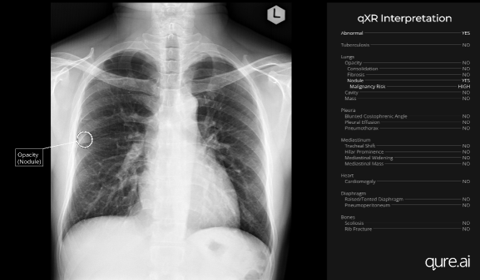
What You Should Know:
– A new study presented at the International Association for the Study of Lung Cancer (IASLC) 2024 World Conference on Lung Cancer offers exciting possibilities for early lung cancer detection.
– Researchers at Phrapokklao Hospital’s Cancer Centre of Excellence in Bangkok, Thailand, used an AI-powered chest X-ray interpretation tool (qXR from Qure.ai) and found promising initial results.
Early Detection is Key
Lung cancer has one of the poorest survival rates among all cancers, primarily due to late diagnoses. Over two-thirds of cases are diagnosed at an advanced stage when curative treatment options are limited. Missed lung cancer diagnoses are a significant concern, both for patients and healthcare providers.
AI Assists in Detecting Missed Nodules
The study, led by Dr. Passakorn Wanchaijiraboon, a Medical Oncologist and Deputy Director, analyzed chest X-ray images of newly diagnosed lung cancer patients over a one-year period. The research focused on “missed” lung cancer, defined as cases where the initial chest X-ray report failed to identify the cancer six months before the definitive diagnosis.
Significant Findings
The study revealed a concerning rate of missed diagnoses. The analysis showed that 18% of patients had missed lung cancer diagnoses, with an average delay of nearly three years (32.3 months) from the initial abnormal chest X-ray. Notably, the delay ranged from eight months to over eight years.
Incidentally Detected Nodules
Interestingly, half of the missed diagnoses involved chest X-rays taken for non-respiratory reasons, often during routine health check-ups. These “incidentally detected” nodules were missed by human interpretation.“This is an exciting evidence example that underscores the transformative potential of AI in the fight against lung cancer,” states Bhargava Reddy, Chief Business Officer, Oncology at Qure.ai. “Overlaying AI on chest X-rays casts the net wider by proactively triaging patients for the risk of lung cancer. It goes beyond people with symptoms or qualifying for screening initiatives based on age or smoking history, to currently invisible and unprofiled patient populations thus detecting lung cancers earlier.”
